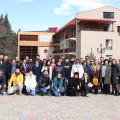The third article of the PEN Charter mentions peace, good understanding between nations, and respect. How realistic is this after the war?
I would focus on all of it – independence, the conflict, and the need for good relations with neighbors. It has all gone so wrong that it is impossible to do anything meaningful without an honest, in-depth, open, fearless, and prolonged discussion.
Do you consider the First Artsakh War, which ended with the victory of the Armenian side, to be sufficiently reflected in our literature? To what extent does the young generation know about this war?
The war has been reflected in our literature, but who can judge whether or not this has been done sufficiently? That war was shown by some good examples in our literature to be a catastrophe. And now we have a second catastrophe. The young generation is now aware of this one. I don’t like the words “victory” and “defeat”. Even the word “competition”. They infer that one side is better than the other, or that there is a scarcity of resources and one side will claim them, while the other will have to give them up. I think this is a huge mistake and presents an archaic understanding that takes us back to the times of cavemen.
Before the Second Artsakh War, there were mutual visits and some contact at the level of non-governmental organizations and people-to-people diplomacy between Armenians and Azerbaijanis as well as Armenians and Turks. In your opinion, why was none of this able to plant the seeds of tolerance among the Turk and Azerbaijani people, why were they unable to reject this xenophobia?
Such contact was too limited, and when the leaders of the states or decision makers do not seek peace, there cannot be any peace. The decision makers have created an atmosphere in which schools, history textbooks and general ideology, maps, media – all of them have preached xenophobia for decades. A few encounters between people from both sides could not change any of that. But, of course, there is a difference between the approaches used by people in Turkey and Azerbaijan. There are more people in Turkey that do not hate the Armenians and who understand what happened. And they express their disagreement—albeit simply as an individual—with the policy that their leader demonstrated during this war.
As a writer and an intellectual, how do you see your own mission when it comes to fostering reconciliation between these peoples and the establishment of good relations with neighbors?
I have to keep writing so that anyone that wants to can read what I want to say. That is my mission. Through my words, I speak on behalf of the whole of humanity and also address the whole of humankind. There must be reconciliation between people – any conflict between nations is artificial and contains an intentional political purpose. I strongly condemn such actions within my own circle and expect us to admit our own obvious errors. And let the others admit theirs. If they don’t, nothing will change.



